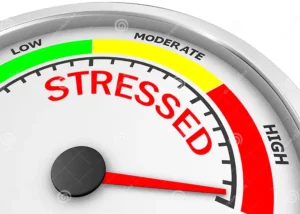
Stressed Out? Let’s Fix That
Your Body on Stress: What happens physiologically?
Your body is built to respond to stress—it’s a survival mechanism. In small doses, stress helps build resilience. It sharpens our focus, improves reaction time, and temporarily boosts immune function.
But when the sympathetic nervous system (fight or flight mode) is constantly activated—without enough recovery time for the parasympathetic system (rest and digest mode) to do its job—imbalance, dysfunction, and eventually illness can occur.

Here’s a glimpse at what that looks like system by system:
Immune System
Chronic stress can suppress immune function, making you more susceptible to infections, slower to heal, and more prone to inflammation. Over time, it may even contribute to autoimmune responses, where the body begins attacking its own tissues.
🔍 Think: more colds, more flares, slower recovery.
Digestive System
Stress diverts blood away from the digestive tract, leading to slowed digestion, bloating, and even changes in gut motility. It also disrupts the gut microbiome and increases intestinal permeability (hello, leaky gut).
🔍 Think: reflux, constipation or diarrhea, nausea, and food sensitivities.
Neuro-Endocrine System
The brain triggers the release of cortisol and adrenaline—key stress hormones. In small doses, they’re helpful. But chronic stress keeps these levels elevated, contributing to brain fog, fatigue, anxiety, and hormonal imbalances.
🔍 Think: wired-but-tired, irregular cycles, sleep issues, mood swings.
Reproductive System
In high-stress states, the body deprioritizes reproduction. This can lead to missed periods, reduced fertility, lower libido, and even erectile dysfunction. Hormonal imbalances are common as cortisol disrupts the HPA (hypothalamic-pituitary-adrenal) axis.
🔍 Think: PMS, libido shifts, cycle irregularity, difficulty conceiving.
Circulatory System
Stress increases heart rate and blood pressure, putting added strain on your cardiovascular system. Over time, this raises the risk of hypertension, heart disease, and stroke.
🔍 Think: racing heart, high blood pressure, chest tightness.
Respiratory System
Stress can cause shallow, rapid breathing, which decreases oxygen exchange and can exacerbate asthma or other lung conditions. Hyperventilation may also trigger feelings of anxiety or panic.
🔍 Think: shortness of breath, chest tension, breath-holding.
Ways to Support the Parasympathetic System
The good news? You don’t need to overhaul your life overnight. Small, intentional shifts can make a profound difference in calming your nervous system and building stress resilience.
☁️ Breathe: Start with your breath. You take roughly 20,000 breaths a day—most of them unconscious—but how you breathe matters.
- Practice slow, deep breathing through the nose.
- Let your belly expand on the inhale.
- Try a simple technique like box breathing or a 4-7-8 breath before bed.
🧘♀️ Move: Movement is medicine—but the type matters.
- Gentle movement like walking or yoga can both energize and ground you.
- If you’re regularly exercising intensely, especially late at night, consider adjusting your routine to allow for more restorative practices.
🥦 Eat Mindfully: Stress changes digestion. You may not absorb nutrients well or may experience bloating, constipation, or diarrhea.
- Slow down at meals.
- Chew thoroughly.
- Support your gut with fiber-rich, whole foods and fermented items.
- Avoid eating on the go or in a state of distraction or tension.
🌿 Explore Adaptogens: Herbs like ashwagandha, rhodiola, holy basil, and reishi may support stress adaptation. These should be used thoughtfully and preferably with guidance, especially if you’re on medications or have underlying health conditions.
📱 Track HRV: Heart Rate Variability (HRV) is a powerful indicator of nervous system balance. Higher HRV generally reflects better resilience and adaptability. Wearables like WHOOP, Oura, or even some smartwatches can track this for daily insight into how well you’re managing stress.
A Final Thought
The world is loud. Stress is constant. But your healing doesn’t have to come in grand gestures—it comes in small, repeatable choices.
I invite you to choose just one way to support your nervous system each day. It might be a mindful breath, a quiet walk, or a moment of gratitude before sleep. Over time, these micro-changes stack up, helping your body shift from surviving to thriving.
You—and your health—are worth it.
References
- https://pmc.ncbi.nlm.nih.gov/articles/PMC11546738/
- https://www.frontiersin.org/journals/psychiatry/articles/10.3389/fpsyt.2023.1240783/full
- https://www.frontiersin.org/journals/nutrition/articles/10.3389/fnut.2021.634897/full
- https://pubmed.ncbi.nlm.nih.gov/33803407/
- https://www.frontiersin.org/journals/behavioral-neuroscience/articles/10.3389/fnbeh.2018.00127/full
- https://www.hubermanlab.com/topics/regulate-your-nervous-system
- https://www.ncbi.nlm.nih.gov/books/NBK278995/
- https://gremjournal.com/wp-content/uploads/2023/01/05_GREM-Journal_3-2022_Lewinski.pdf
- https://www.frontiersin.org/journals/endocrinology/articles/10.3389/fendo.2023.1329564/full
- https://pmc.ncbi.nlm.nih.gov/articles/PMC9225328/
- https://pmc.ncbi.nlm.nih.gov/articles/PMC9369438/
- https://www.heart.org/en/healthy-living/healthy-lifestyle/stress-management/stress-and-heart-health
- https://www.lung.org/lung-health-diseases/lung-disease-lookup/asthma/managing-asthma/reduce-asthma-triggers/manage-stress
- https://www.rupahealth.com/post/breathing-techniques-and-lung-health-a-functional-medicine-approach
At Canopy Wellness, we take a functional medicine approach to uncovering root causes and creating personalized wellness plans. Book a Free 15-Minute Consultation Today! 💚 Head to our Work With Me page to check out program offerings and don’t forget to sign up for our free monthly newsletter below where we delve into topics like lifestyle medicine, ingredient highlights, medication concerns and more.
Disclaimer
At Canopy Wellness, your health and well-being are our top priority. The information shared in our blog posts is intended for educational and informational purposes only and should not be taken as medical advice. If you are experiencing a health concern, we encourage you to consult with a qualified healthcare professional for personalized guidance and support.
While you explore ways to nourish your body through whole foods, quality sleep, stress management, and lifestyle practices, please remember that these suggestions are not a replacement for professional care. Always seek the advice of your healthcare provider with any questions you may have regarding a medical condition or treatment.

Awesome
Awesome
Very good
Very good
Awesome
Good
Super
Super
Very good